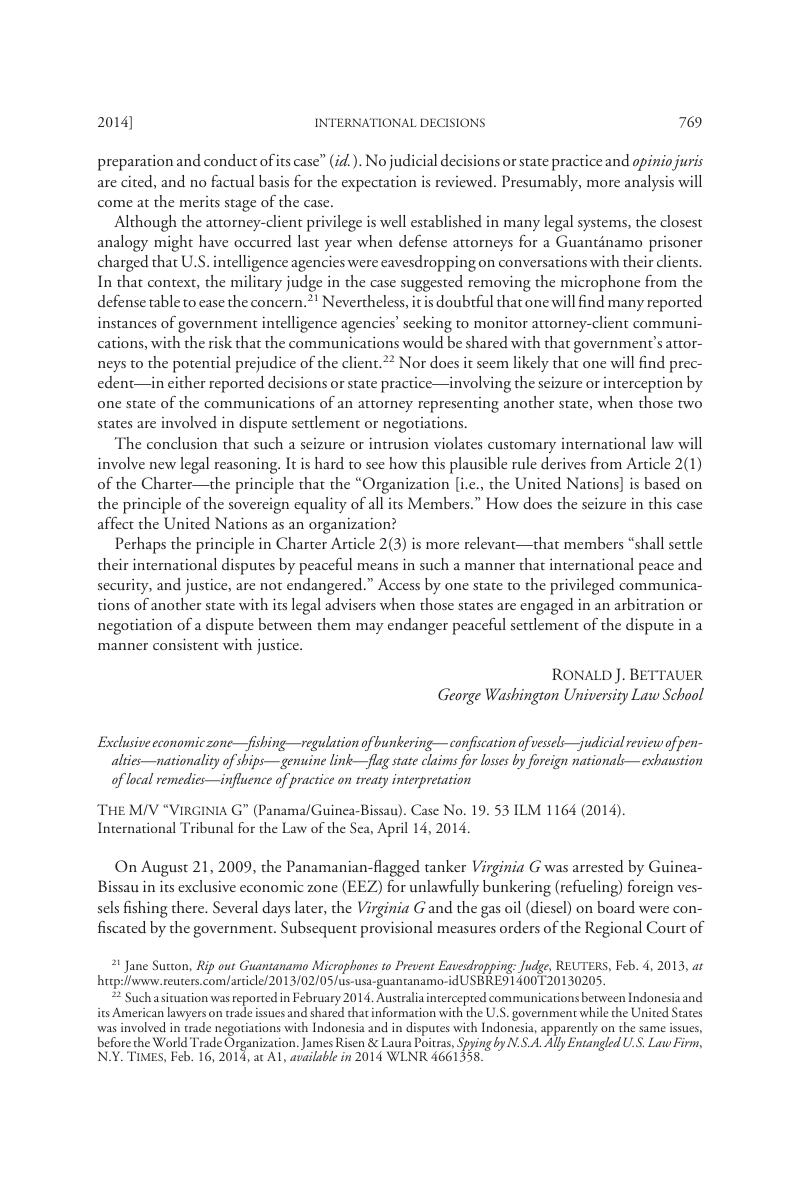Published online by Cambridge University Press: 20 January 2017

1 M/V Virginia G (Pan./Guinea-Bissau), Case No. 19 (ITLOS Apr. 14, 2014), 53 ILM 1164 (2014) [hereinafter Judgment]. Judgments of the Tribunal cited herein are available at its website, http://www.itlos.org.
2 United Nations Convention on the Law of the Sea, Art. 73(1), opened for signature Dec. 10, 1982, 1833 UNTS 397, available at http://www.un.org/depts/los/[hereinafter Convention].
3 Former ITLOS Judge Tullio Treves and Professor José Manuel Sérvulo Correia were appointed by Panama and Guinea-Bissau, respectively, as judges ad hoc.
4 Article 297 limits compulsory jurisdiction over disputes concerning the exercise of coastal state sovereign rights, including fishing in the EEZ.
5 Quoting M/V Saiga (No. 2) (St. Vincent v. Guinea), 1999 ITLOS Rep. 10, 42, para. 83 (reported by Bernard H. Oxman & Vincent Bantz at 94 AJIL 140 (2000)) [hereinafter Saiga (No. 2)].
6 This analysis casts doubt on alternative hypotheses advanced at the International Law Commission in the 1950s and more recently at the International Maritime Organization, the Food and Agriculture Organization, and the UN General Assembly. See Cogliati-Bantz, Vincent P., Disentangling the “Genuine Link”: Enquiries in Sea, Air and Space Law, 79 Nordic J. Int’l L. 383, 398–415 (2010)CrossRefGoogle Scholar.
7 Saiga (No. 2), at 48, para. 106.
8 Draft Articles on Diplomatic Protection, Art. 14(1), in Report of the International Law Commission, Fifty-Eighth Session, UN GAOR, 61st Sess., Supp. No. 10, at 16, 20, UN Doc. A/61/10 (2006).
9 Panama initially argued that it was bringing the case “within the framework of diplomatic protection,” Judgment, para. 119, but thereafter maintained that it was claiming “a violation of its own right to secure, in respect of vessels flying its flag, freedoms for which the Convention provides,” id., para. 142. Panama added that it would allocate respective portions of the compensation it might be awarded to the private parties who suffered damage or loss. Id., para. 143.
10 Two judges, who believed that the claim was preponderantly brought on the basis of an injury to private persons, nevertheless concluded that exhaustion of local remedies was not required because the “repeated intrusion of the political and administrative authorities of the country into the course of justice precluded the possibility of any effective redress or reparation.” Judgment, Joint Separate Opinion of Judges Cot and Kelly, para. 32.
11 The Tribunal did not address the environmental protection argument made by Guinea-Bissau, noting that “Guinea-Bissau incorporated its regulations on bunkering in its legislation on fishing rather than in legislation concerning the protection of the marine environment.” Judgment, para. 224.
12 Saiga (No. 2), supra note 5, at 54, para. 127.
13 Article 62(4) of the Convention permits the coastal state to require, from foreign vessels permitted to fish in the EEZ, “fees and other forms of remuneration” and other benefits related to fishing that are of economic value to itself and its nationals. The opinion does not purport to limit that right, or the collection of royalties, taxes, and other revenues in connection with the issuance, enjoyment, and exercise of rights to explore and exploit hydrocarbons and other resources of the continental shelf.
14 Citing Tomimaru (Japan v. Russ.), Prompt Release, 2005– 07 ITLOS Rep. 74, 96, para. 72 (reported by Ber nard H. Oxman at 102 AJIL 316 (2008)).
15 Claims for lost profits of the charterer after the termination date of the charter party were rejected on contractual grounds. Judgment, para. 437. Contra Separate Opinion of Judge Akl, paras. 9–10.
16 Camouco (Pan. v. Fr.), Prompt Release, 2000 ITLOS Rep. 10, 32–33, para. 71 (reported by Bernard H. Oxman & Vincent P. Bantz at 94 AJIL 713 (2000)).
17 The Tribunal did not, however, assert that the subsequent practice amounted to an agreement of the parties regarding the interpretation of the Law of the Sea Convention. See Vienna Convention on the Law of Treaties, Art. 31(3)(b), opened for signature May 23, 1969, 1155 UNTS 331.
18 The majority on these issues did not include judges from African or Lusophone countries.
19 See Convention, supra note 2, Art. 297(1)(a).
20 This is not the first time that the Tribunal has confronted complexity and lack of clarity in coastal state legislation. The law of Guinea-Bissau created confusion in the Juno Trader case over the effect of a decision by an administrative body to confiscate the vessel. See Juno Trader (St. Vincent v. Guinea-Bissau), Prompt Release, 2004 ITLOS Rep. 17; Bantz, Vincent P., Views from Hamburg: The Juno Trader Case or How to Make Sense of the Coastal State’s Rights in the Light of Its Duty of Prompt Release , 24 U. Queensl. L. J. 415, 422 (2005)Google Scholar. In the Tomimaru case, supra note 14, considerable controversy surrounded the procedure in Russian law applicable to a bond in parallel administrative and criminal proceedings.
21 Quoting Tomimaru, supra note 14, at 96, para. 76.
22 See Judgment, Separate Opinion of Judge Akl, passim; Separate Opinion of Judge Paik, paras. 39–48; Declaration of Judge ad hoc Treves, paras. 2–4.